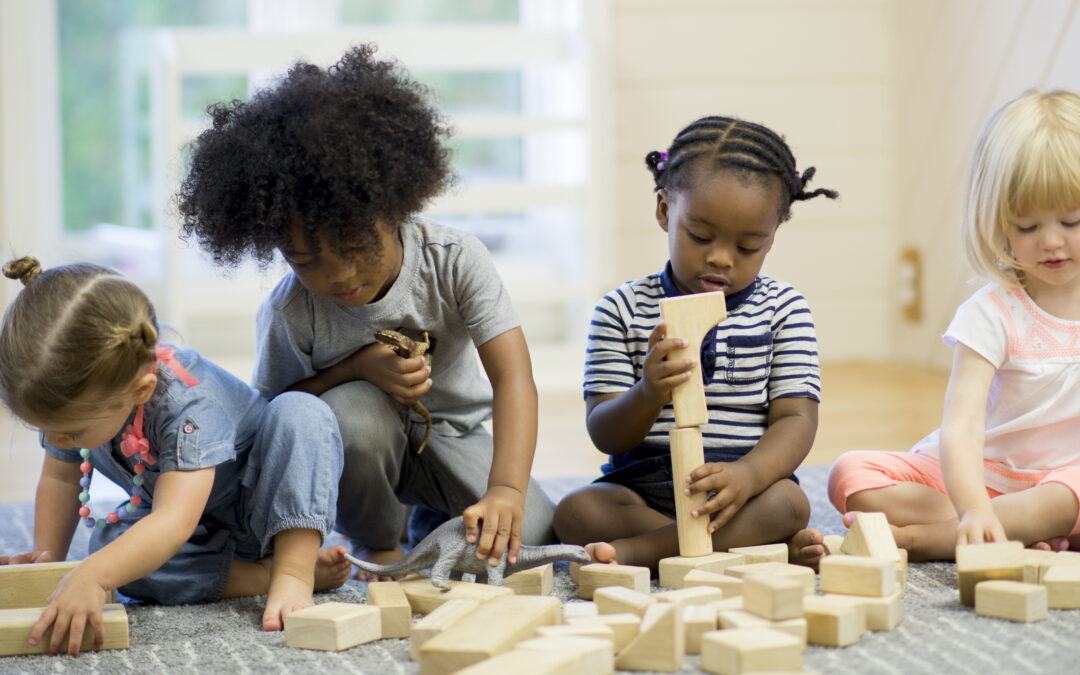How to Help Young Kids Develop Social Skills
1. Practice
Since social skills can be learned and improved, practice is essential. For example, when teaching cooperation, have the child work as a team on a small project like clearing toys. By creating opportunities for them to exercise their skills, you can monitor their progress and find more teachable moments.
2. Read
Many children’s books have lessons built into them and kids love story time. While reading to them, intermittently stop to ask them social questions. To develop listening, you can ask them what they remember so far. For empathy, ask them about the characters’ feelings and how they would handle the situations presented.
3. Use Play
Play time can provide opportunities to engage in various social situations through make-believe. For instance, when teaching a child how to respect someone’s personal space, pretending that they’re in line at the grocery store can help them to understand the concept, practice doing it, and may help them remember next time they’re at the store.
4. Praise
Offering praise for appropriate behaviors is an effective method to encourage kids in developing their social skills. It is important to compliment them on a job well done outside of active social skills lessons as well as during them. Take a moment to tell them you’re proud when they graciously share a toy with another child without being told to.
5. Learn to Ask Questions
Questions are the best way to learn. Encourage your child to ask questions of yourself and others. Allow them to jump on the phone and call relatives and friends for a Q and A session.
Having a conversation with someone and asking them questions opens a child to new types of experiences and connections. Suggest using a mixture of open ended questions to promote conversation as well as a simple yes/no answers.
6. Teach Them Emotions
Knowledge is power! Sharing knowledge about emotions and emotional health is the best way to improve your child’s social skills.
To our children we’re not simply parents, we’re role models, teachers, coaches and leaders. We can show our children the difference between positive emotions and negative ones by simply teaching them.
Try not to cross emotions. Hold a straight face when you’re talking to them about doing something wrong and use your words to explain how you’re feeling. Share your emotions during different situations. Explain that you can cry when you’re happy as well as when you’re sad.
7. Know Your Child’s Limits
Every child socializes in a different way. An introverted child might tire quickly when in busy and loud social scenes, whereas an extraverted child might thrive in them but dislike quieter or intimate spaces. Don’t force your child into social scenes that they’re not comfortable in, give them chances to learn at their own page, in their own time. After all, we crawl before we can run, so these baby steps into bigger social situations are important.
8. Prepare Them for Higher Level Social Skills
Higher level social skills, like negotiation, conflict resolution, assertiveness, non-verbal communication and public speaking will become more important as your child gets older, so it is important to practice them from a young age.
Encourage your child to tell stories and speak in front of groups of relatives and friends, get them to use body language when communicating, force a negotiation with them when considering buying a treat or toy and make them argue their point across. These are all skills we use in the workplace so practicing them as a child will help them as they get older.
9. Be a Good Role Model
This is often understated and forgotten but it is vital for you to be a good social role model. To improving your child’s social skills, it can be as simple as acting responsibly, listening, showing them good communication skills and being respectful.
Explain your emotions to them, use eye contact, apologies for mistakes and use empathy. These are all ways that you can be a great role model.
If you’re looking for a day care for your child to expand their social circle, take them to Rising Stride Child Care Centers in Drexel Hill and Woodlyn. Our center seeks to enhance children’s development by providing age-appropriate activities to stimulate kids’ success. They tailor their approach to the individual child’s personality to help nurture a sense of self-esteem. Visit us online to learn more about our approach and to schedule a tour.

